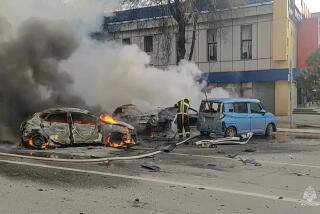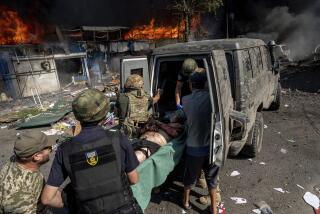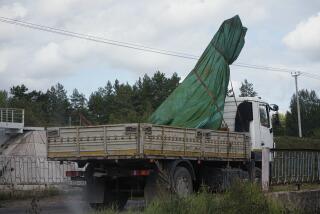Bombing Ignites Anger in Russia
MOSCOW — At a time when world attention has been riveted on events in the Middle East and Afghanistan, the continuing drip, drip, drip of carnage on Russia’s southern rim rarely gets noticed.
But the bomb filled with nails, nuts and bolts that ripped apart schoolchildren and Russian army musicians in the republic of Dagestan on Thursday, fatally wounding 41 people during a moment of national celebration, is not likely to be soon forgotten in Moscow.
President Vladimir V. Putin immediately blamed Islamic extremists who have been waging war in neighboring Chechnya, and vowed that they would be treated like the Nazis whom Russia and its Western allies eradicated in World War II.
The bombing occurred just as Putin was addressing a parade in Moscow’s Red Square to mark Victory Day, a commemoration of the triumph over Nazi Germany that remains one of Russia’s most meaningful and emotional holidays.
Russia is used to being widely criticized in the West for human rights abuses in Chechnya. However, it believes the U.S. should start to get behind its campaign against extremists in the Caucasus. That is a message Putin will be reinforcing to President Bush at a Moscow summit later this month, several analysts said.
Bush’s public comments of condolence to Russia are a sign that he is coming around to Putin’s viewpoint and is starting to see the Chechen conflict, which has frequently spilled over into Dagestan and other neighboring republics, as part of the wider war on terrorism, said political analyst Liliya F. Shevtsova of the Carnegie Moscow Center think tank.
“One should not expect any U.S. pressure on Moscow to expedite a peaceful end of the Chechen conflict any time soon,” she concluded. On the contrary, the bombing in the Caspian seaside town of Kaspiysk “will only cement the existing rapport between Washington and Moscow” on terrorism.
The official death toll in the bombing rose Friday to 41, including 17 children. More than 90 people still were hospitalized, Dagestani officials said.
Authorities reported that some suspects had been arrested for questioning in connection with the bombing. The Federal Security Service was leading the investigation, and local residents were reportedly coming forward with tips on possible suspects.
An amateur videotape played on television showed children frolicking behind a military brass band Thursday morning, followed by a sickening shudder and a cloud of smoke. The children and musicians suddenly come into focus again--this time as piles of bleeding bodies lying on the pavement as survivors scream in pain.
Despite being inured to terrorist acts in the northern Caucasus region, Russians were thrown into stark fury.
“The people who committed the crime should be brought here, put right in the place where it happened, and then be cut into pieces, so that they themselves would experience the same pain,” one indignant woman in Kaspiysk told the NTV television network.
“For many people, this act of terror is and will be the most painful experience of their entire lives, an experience never to be forgotten,” Kaspiysk Mayor Dzhamaludin Omarov, a former police colonel, said in a phone interview.
“I personally can still hear the screams and see the dead bodies in my mind’s eye,” he said. “The entire town is in mourning.”
Suspicion immediately came to rest on the separatist movement in neighboring Chechnya or its sympathizers in Dagestan. The separatists have been waging a war against Russian police and soldiers since fall 1999. In recent weeks, Russia claimed to be making headway, trumpeting the death of an Arab commander, Khattab, who was reportedly killed with a poison-laden letter.
Russian policy toward separatists is already harsh, including repeated roundups and arrests in Chechnya. Human rights groups have reported “disappearances” of young men from villages there. But if the bombers thought the attack would bring them closer to their goals, just the opposite may be true, said Shevtsova.
“Instead of peace, the terrorist act will spur the federal authorities to intensify the campaign aimed at knocking out the remaining Chechen warlords,” she said. Such a brazen attack “makes a peace deal indefinitely remote.”
Dagestan’s envoy in Moscow, Ramazan Magomedov, said he wants to see prison sentences for terrorist acts extended beyond the current five to 10 years. The masterminds behind Thursday’s crime, he said, were most likely Islamic extremists with ties to international terrorist organizations, and they may already have escaped to Chechnya or elsewhere in Russia.
Alexander I. Zhilin, a Moscow-based military analyst, said he believed the attackers may have been influenced by the tactics that some Palestinians have adopted against Israel--trying to inflict maximum suffering on a more militarily powerful foe.
“The terrorist act in Kaspiysk ... will only make the authorities more determined to finish the rebels off as soon as possible,” Zhilin said. “The country has been waiting for this for way too long, and now it is high time.”
However, he doubted that Russians would long remember the bombing. After a few weeks, they will simply block it out, as they have many other bitter experiences, he said.
“If Russians were to commemorate every single tragedy that occurs, then most of the calendar would have been colored black a long time ago,” he said.
*
Alexei V. Kuznetsov of The Times’ Moscow Bureau contributed to this report.
More to Read
Sign up for Essential California
The most important California stories and recommendations in your inbox every morning.
You may occasionally receive promotional content from the Los Angeles Times.










